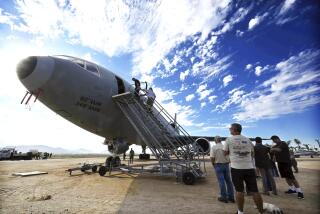Depression symptoms are common among active airline pilots, international survey reveals

The study, published Dec. 14 in the journal Environmental Health, was prompted by the March 2015 murder-suicide of a pilot for the European airline Germanwings. (Dec. 15, 2016)
- Share via
Behind the self-confident gait, the friendly greeting and the air of superb competence, as many as 13% of the nation’s commercial airline pilots may be suffering from depression, and roughly 1 in 25 report they’ve had suicidal thoughts in the last two weeks, a new study reveals.
But the researchers — the first to ask a large sample of airline pilots about their mental health — suggest that depressed pilots are reluctant to seek treatment for their depression for fear of being grounded or damaging their careers.
For the record:
10:45 a.m. Dec. 15, 2016A previous version of this story implied that 75 out of 3,278 airline pilots who answered a survey had experienced suicidal thoughts in the previous two weeks. In fact, it was 75 out of 1,798 who answered more detailed questions about their mental health.
Prompted by the March 2015 murder-suicide crash carried out by a pilot for the European airline Germanwings, the study authors were determined to find out how many pilots struggle with a disorder that affects more than one in five Americans at some point over the course of their lives.
Using emails, newsletters, advertisements and postcards, the authors recruited 3,485 working commercial pilots to complete an anonymous health survey. Embedded in the wide-ranging questionnaire was a standard battery of questions used to detect depression.
What they found might come as a surprise. Of 3,278 pilots surveyed, 426 met the diagnostic threshold for likely depression. Among 1,798 pilots who answered more detailed questions about their mental health, 75 participants reported that they had had thoughts of self-harm, or had thought they might be better off dead, in the previous two weeks.
Pilots who used more sleep-aid medication, as well as those who reported they were subjected to verbal or sexual harassment, were at higher risk of depressive symptoms, the study found.
Female pilots, who make up just 4% of the commercial airlines’ pilot workforce, reported more days with poor mental health and having more diagnosed depression than male pilots, the study found. That trend tracked with women’s higher depression rates in the general population.
The study, published Wednesday in the journal Environmental Health, offers a preliminary tally of a problem that has long been recognized but, until now, was largely unmeasured. Its findings should help spur programs to prevent and treat depression in this specialized workforce, the researchers said.
But they should not undermine public confidence in pilots’ ability to perform their jobs, the authors said.
“Flying is safe and this study doesn’t change that,” said senior study author Joseph G. Allen, who studies occupational environmental exposures at Harvard University’s T.H. Chan School of Public Health.
Allen’s comments were echoed in a statement from the Air Line Pilots Assn. International, which represents more than 54,000 pilots employed by U.S. and Canadian commercial airlines.
“The airline pilot profession in North America is one of the most highly vetted careers today,” and U.S. pilots “are continuously evaluated throughout their careers,” ALPA said in a statement responding to the new research. In addition to continuing training, audits and medical exams, ALPA said, flight and cabin crew members “monitor and evaluate each other while on duty,” and many measures are in place to ensure safe operations.
“It is important to remember that airline travel is the safest mode of transportation in the world,” ALPA added. “Pilots for U.S. carriers alone safely accomplish 27,000 takeoffs and landings each day, in every kind of adverse weather and operational conditions.”
For many decades, the Federal Aviation Administration, which oversees airline safety, grounded pilots who acknowledged they were depressed or were taking antidepressants. But accident investigations and other research have turned up evidence that pilots who suffered depression were either not getting treatment or were taking antidepressants without reporting those medications to Aviation Medical Examiners, who must clear them to fly.
In 2010, the FAA announced that pilots with mild-to-moderate depression could continue flying if they have been taking one of four approved antidepressants for 12 months with satisfactory results.
At that time, then-FAA Administrator Randy Babbitt called on the agency to “change the culture and remove the stigma associated with depression.” But Allen said that commercial airlines continue to have a patchwork of policies governing depression treatment. Working commercial pilots remain reluctant to acknowledge or seek treatment for depression, he added.
Worldwide, 140,000 pilots fly commercial airliners, and half of those fly in the United States. In an occupation traditionally populated by former military officers, pilots were long assumed to be free of the mental health woes that plagued ordinary Americans.
But evidence has mounted in recent years that having the “right stuff” confers no immunity to the sadness, guilt, irritability, and loss of interest and energy that are depression’s hallmarks.
In addition to the normal wear-and-tear of life, airline pilots work long hours and have irregular schedules that can keep them from home. Future research, the authors said, should focus on the impact of sleep irregularities and circadian rhythm disruption on this specialized workforce, and their relationship to depression.
Click here for a Spanish version of this story
Follow me on Twitter @LATMelissaHealy and “like” Los Angeles Times Science & Health on Facebook.
MORE IN SCIENCE
Santa’s Christmas gift-giving has nothing to do with whether kids are naughty or nice, study shows
Sorry, Pokemon Go addicts, playing the video game doesn’t count as a real workout
Seahorses are some of the strangest fish in the sea. Can their genome tell us why?







